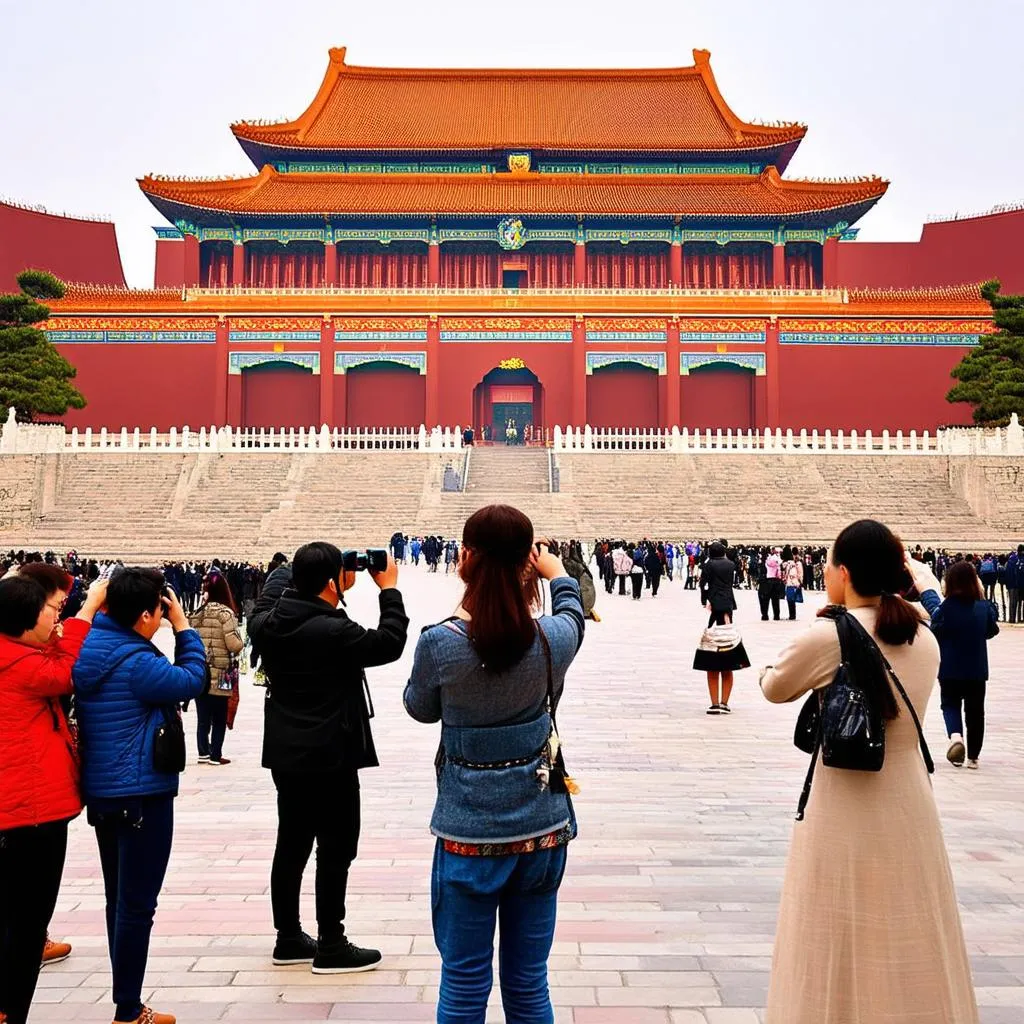Have you ever dreamt of wandering through the bustling streets of Beijing, ordering delicious dumplings in Shanghai, or asking for directions to the Great Wall in fluent Mandarin? Learning Chinese for travel can unlock a world of unforgettable experiences. Instead of just seeing China, you’ll truly experience its heart and soul. Let’s embark on this journey together and discover how to navigate the Middle Kingdom with confidence!
 Forbidden City
Forbidden City
Why Learn Chinese for Travel?
While many people in tourist areas may speak some English, learning basic Mandarin can significantly enhance your trip. Here’s why:
Deeper Cultural Immersion:
Language is the key to unlocking cultural nuances. Even knowing basic phrases like “Ni hao” (hello) and “Xiexie” (thank you) will bring smiles to locals’ faces and lead to more authentic interactions. Imagine navigating a local market, bartering for souvenirs, and understanding the stories behind ancient traditions – all through the power of language.
Enhanced Travel Experience:
From ordering food to asking for directions, knowing some Chinese will make your travels smoother and more enjoyable. No more pointing at menus and hoping for the best!
Personal Growth and Confidence:
Stepping outside your comfort zone and learning a new language, especially one as challenging as Chinese, is incredibly rewarding and boosts confidence.
Essential Chinese Phrases for Travelers
Let’s dive into some essential Mandarin phrases that will empower you to navigate your travels:
Greetings and Essentials:
- Nĭ hăo (你好): Hello
- Nĭ hăo ma (你好吗)?: How are you?
- Wŏ hĕn hăo (我很好), xièxie (谢谢): I’m fine, thank you.
- Qĭngwèn (请问): Excuse me (used when asking a question)
- Xièxie (谢谢): Thank you
- Bù kèqì (不客气): You’re welcome
- Duìbùqĭ (对不起): I’m sorry
- Méiguānxi (没关系): It’s okay
- Wŏ bù míngbai (我不明白): I don’t understand.
- Qĭng nĭ shuō màn yīdiăn (请你说慢一点): Please speak slower.
Getting Around:
- … zài năr? (…在哪儿?): Where is …?
- Cèsuǒ zài năr? (厕所在哪儿?): Where is the bathroom?
- Qù … zěnme zǒu? (去…怎么走?): How do I get to …?
- Wŏ yào qù… (我要去…): I want to go to…
- Chēzhàn zài năr? (车站 在 哪儿?): Where is the bus stop?
- Jīchǎng zài năr? (机场 在 哪儿?): Where is the airport?
Dining and Shopping:
- Wŏ yào zhège (我要这个): I’ll take this one.
- Duōshao qián? (多少钱?): How much is it?
- Tài guì le (太贵了): Too expensive.
- Yǒu méiyǒu …? (有没有…?): Do you have …?
- Fúwùyuán (服务员): Waiter/Waitress
Tips for Learning Travel Chinese:
- Start early: Begin learning basic phrases a few months before your trip.
- Use Language Learning Apps: Apps like Duolingo, HelloChinese, and Pleco are great resources.
- Focus on pronunciation: Tonal languages like Mandarin require careful attention to tones.
- Practice with native speakers: Look for language exchange partners online or in your local community.
- Don’t be afraid to make mistakes: The key is to communicate, even if it’s not perfect!
 Great Wall of China
Great Wall of China
Planning Your Trip: Feng Shui and Travel
In Chinese culture, Feng Shui plays a significant role in harmonizing individuals with their surroundings. Incorporating Feng Shui principles into your travel planning can enhance your journey:
- Choose auspicious travel dates: Consult a Chinese calendar or a Feng Shui practitioner to select dates that align with positive energies for travel.
- Pack mindfully: Pack items in colors that represent the elements you want to attract during your trip (e.g., red for good luck, green for growth).
- Arrange your hotel room: Upon arrival, arrange your belongings in a way that promotes positive energy flow (e.g., avoid placing your bed in line with the door).
FAQs about Learning Chinese for Travel
Q: How much Chinese do I really need to know for travel?
A: Even knowing a few basic phrases can make a big difference in your interactions and overall experience.
Q: Is Chinese a difficult language to learn?
A: Chinese grammar is different from English, and the tones can be challenging, but with dedication and practice, it’s achievable.
Q: Where can I find language exchange partners?
A: Apps like HelloTalk and Tandem connect language learners worldwide.
Explore More with Travelcar.edu.vn
Planning your dream trip to China? Visit travelcar.edu.vn for comprehensive travel guides, tips on navigating transportation, cultural insights, and more!
Conclusion
Learning even a little bit of Chinese before your trip to China can transform your experience from ordinary to extraordinary. Embrace the challenge, start practicing those phrases, and prepare for a journey filled with authentic connections and unforgettable memories. Happy travels!